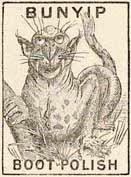WE HAVE all heard of the village idiot who, when asked why
an illiterate man would write a letter his dog, replied that everything was OK
because, while he could not write, the dog could not read. This morning in the
Age, the old saw is given something of a modern twist, the opinion page being
supplied with a pair of writers who dispense ignorance to readers via editors who
know no better. The
star attraction is Stephan Loondowsky who, as usual, serves up a litany of
falsehoods, not least of which is the assertion that former Senator Nick
Minchin and his sceptical kind deny the link between tobacco and poor health.
There is nothing terribly new about Loondowsky’s latest seepage, which should
not come as a surprise. The only thing more given to stupidity and repetition
than Age contributors are the editors who publish them. Just in case you have
forgotten Loondowsky’s urgent need for treatment, here is everything in today’s
op-ed but delivered in spoken form:
Now Loondowsky
takes some topping -- although not, thankfully, in any sense that might get Peter Slipper
excited -- but the Age manages it all the same by deploying the Parkville
Asylum’s Don Edgar, who goes on at great length about society’s obligation to
provide for all. To support this view, Edgar
quotes Alfred Dolittle from Shaw’s Pygmalion. And remember, Edgar is aprominent academic, someone you might imagine to enjoy more than a nodding
familiarity with one of the last century’s most notable plays. Here is his
version of Dolittle:
George Bernard Shaw's Pygmalion character Alfred Doolittle laments his lot as one of the ''undeserving poor'': "Think what it means to a man … he's up against middle-class morality all the time … 'You're undeserving, so you can't have it' … I don't need less than a deserving man: I need more …'' Doolittle was right. Evidence suggests it is rich, well-educated, higher-status people who feel entitled, not the poor.
Here is Dolittle’s
original speech. As readers will note, Shaw is ridiculing both Dolittle’s
selfish, grasping sense of entitlement and his eagerness to “sell” daughter
Eliza for a quick fiver.
What am I, Governors both? I ask you, what am I? I'm one of the undeserving poor: that's what I am. Think of what that means to a man. It means that he's up agen middle class morality all the time. If there's anything going, and I put in for a bit of it, it's always the same story: 'You're undeserving; so you can't have it.'
But my needs is as great as the most deserving widow's that ever got money out of six different charities in one week for the death of the same husband. I don't need less than a deserving man: I need more. I don't eat less hearty than him; and I drink a lot more. I want a bit of amusement, cause I'm a thinking man. I want cheerfulness and a song and a band when I feel low. Well, they charge me just the same for everything as they charge the deserving.
What is middle class morality? Just an excuse for never giving me anything. Therefore, I ask you, as two gentlemen, not to play that game on me. I'm playing straight with you. I ain't pretending to be deserving. I'm undeserving; and I mean to go on being undeserving. I like it; and that's the truth. Will you take advantage of a man's nature to do him out of the price of his own daughter what he's brought up and fed and clothed by the sweat of his brow until she's growed big enough to be interesting to you two gentlemen? Is five pounds unreasonable? I put it to you; and I leave it to you.
As all but Prof Edgar knows, Shaw was a socialist and keen to improve the lot of the downtrodden by, amongst
other things, keeping the lucre of largesse away from graspers like Dolittle.
Somehow, by the end of his column, Edgar has arrived at precisely the opposite
conclusion, writing: “We should not pit the ‘deserving’ against the ‘undeserving
poor’, or we will all be poorer in every way.”
If you are inclined to spare a kind thought for the poor,
focus first on Fairfax shareholders, who grow poorer by the
day. Do you think the piffle their newspapers publish might have something
to do with it?
